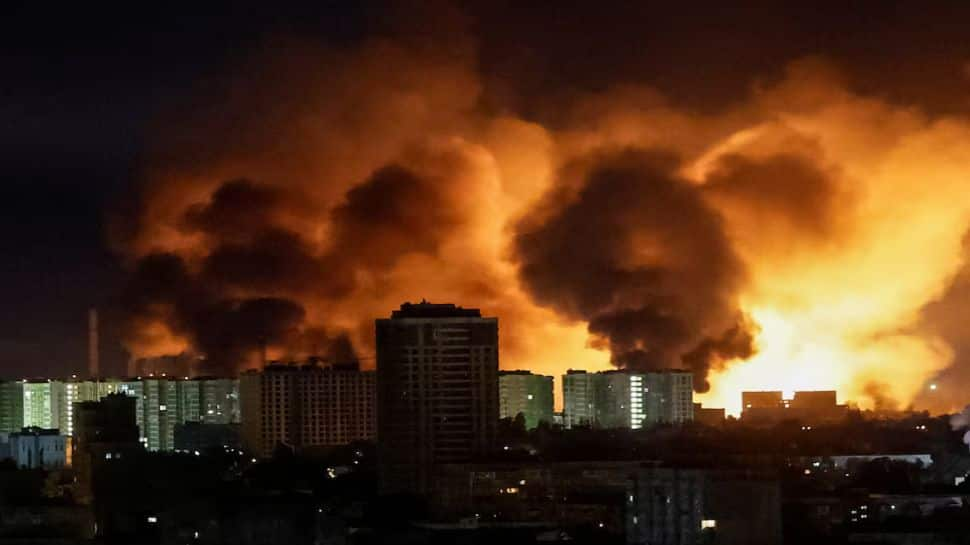In the early hours of 2025, Ukraine experienced one of its most devastating nights since the conflict began, as multiple regions across the country, notably the western city of Ternopil, were rocked by a massive wave of Russian missile and drone strikes. The attacks caused widespread destruction, significant loss of life, and severe damage to critical infrastructure, marking a grim escalation in the ongoing war.
Ternopil, a city in western Ukraine, bore the brunt of the overnight assault. According to the Ukrainian Ministry of Internal Affairs, the city suffered heavy casualties, with at least 25 people reported dead and 73 injured. Among the victims were three children, highlighting the tragic impact on civilians. The attack struck residential neighborhoods, with entire blocks of nine-storey apartment buildings targeted in the bombardment. The strikes ignited major fires that raged for hours, complicating rescue efforts and causing extensive structural damage.
Emergency response teams immediately sprang into action as the city awoke to the aftermath of the shelling. The State Emergency Service and the National Police deployed around 45 specialized units, including advanced robotic systems, to navigate the treacherous conditions of burning buildings and collapsed walls. Their mission was to locate and rescue survivors trapped beneath the debris. The operation was described as frantic and ongoing, as responders continued combing through rubble in several neighborhoods throughout the morning. The scale of destruction was described as “significant,” with officials emphasizing the urgency of reaching those still trapped.
President Volodymyr Zelenskyy addressed the nation, revealing that the attacks on Ternopil were part of a broader offensive spanning multiple regions. He stated that Russian forces launched more than 470 attack drones and 48 missiles during the night, including at least one ballistic missile alongside numerous cruise missiles. These weapons were fired in waves, overwhelming Ukrainian air defenses and causing widespread damage to both residential areas and critical public infrastructure.
Ternopil was not the only city affected. In Kharkiv, Ukraine’s second-largest city in the east, a separate barrage caused injuries to dozens of residents, including children, while damaging essential transport links and energy supply points. The western city of Ivano-Frankivsk also suffered attacks, with three people injured, two of whom were children. Additionally, other regions including Lviv, Donetsk, Kyiv, Chernihiv, Mykolaiv, Cherkasy, and Dnipro experienced strikes that targeted energy facilities and civilian areas, exacerbating the humanitarian and logistical challenges facing Ukraine.
The Ukrainian president used social media platforms to share updates and urged the international community to recognize the severity of the attacks. He emphasized that Ukraine urgently requires enhanced air-defense missiles, additional defense systems, combat aircraft support, and increased drone production to mitigate further casualties. Zelenskyy highlighted that the conflict has now entered its fourth year, and he called for Russia to be held accountable for the ongoing aggression.
In the context of these escalating hostilities, Ukraine also reported progress on the diplomatic and support fronts. President Zelenskyy recently concluded visits to Greece, France, and Spain, where he secured significant security and economic pledges totaling over 515 million euros. These commitments are crucial for bolstering Ukraine’s resilience as the war continues.
Greece pledged to guarantee gas supplies for the winter, a vital assurance given the energy vulnerabilities caused by the conflict, and committed to expanding its role as an energy hub in the region. This development is particularly important as Ukraine faces threats to its energy infrastructure amid ongoing attacks.
France reaffirmed its commitment to strengthening Ukraine’s defense capabilities through a comprehensive long-term agreement. This package includes the delivery of 100 Rafale F4 fighter aircraft by 2035, the provision of SAMP/T air-defense missile systems, advanced radar technology, and additional military aid. The deal represents a significant enhancement of Ukraine’s air defense and combat capacity over the next decade.
Spain announced new support packages as well, which include 100 million euros allocated for air-defense missiles, 215 million euros for the Strategic Advanced Financing and Energy (SAFE) instrument, and 200 million euros to assist Ukraine’s energy sector. Spain’s contribution also features the provision of IRIS-T missiles, further strengthening the country’s defense against aerial attacks.
The combined support from these European partners underscores the growing international commitment to assist Ukraine in its struggle to defend its sovereignty and protect its civilian population. These alliances are critical as the country braces for continued aggression and seeks to rebuild vital infrastructure damaged in the

